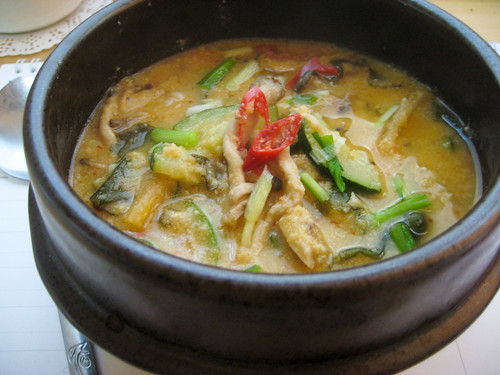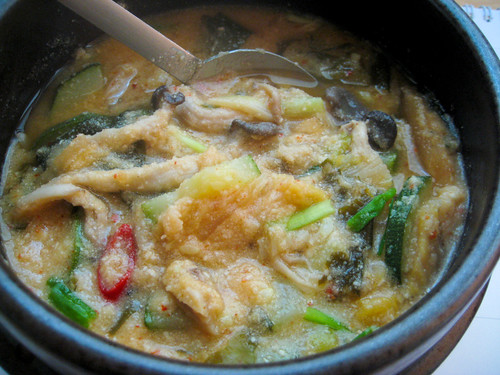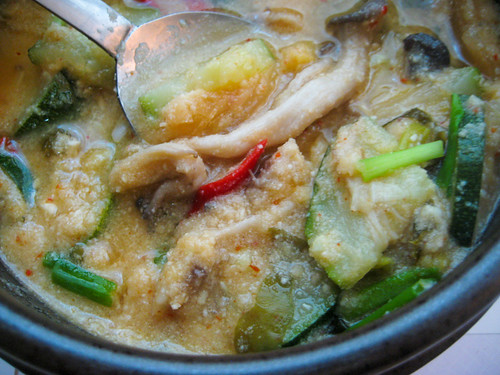Since going on this month's Locavore challenge, I've been making my own soy milk about once a week. While the soy milk gets used up quickly enough in things like tea and baking, the collected pile of okara ("biji" in Korean) has been growing bigger and bigger, threatening to overtake my entire freezer. So to counteract this problem, I've started throwing spoonfuls of okara into anything and everything, from jjigae (soup) and ramen noodles, to muffin batter and even oatmeal! It's kinda becoming a habit or a nervous twitch, like, "Hm, what's missing from this dish... Oh, I know! Let's throw in some okara!" Thankfully, adding just a spoonful or two doesn't really change the flavor of anything, so I'm not sick of it yet. In fact, I like the thickness it gives to soups etc~ Plus, it's also a good way to get a little extra protein and loads of fiber into your diet! Gotta stay regular, folks~

Anyway, one great way to use up soy bean pulp is to make a Korean dish called 'biji jjigae' (okara soup/stew). I love this dish but a lot of restaurants serve it with shrimp sauce or bits of pork, so I usually steer clear. However, since I have a massive supply of biji, I've been making my own vegan version, several times a week. Normally, recipes call for blended up whole soy beans (not just the pulp), but in my case, that kind of defeats the purpose of getting rid of the okara while reserving the soy milk for other purposes, so I just use the pulp.
Depending on your method for making soy milk, you might have either raw or cooked okara. I've made biji jjigae with both and it really doesn't make much difference in terms of taste or texture. However, if you're using raw okara, you'll just want to give it some more time to actually cook, than if you were just throwing in some pre-cooked pulp. Also, my soup is more 'watery' than the standard version which is much thicker and creamier. For creamier results, I'm guessing that just you could just add some of the soy milk back to the okara. Finally, I like making biji jjigae with vegan kimchi, but a lot of Koreans make it without so that it's plain and white. In this case, you might want to add some more soysauce or salt to make up for the saltiness from the kimchi.

Vegan Biji Jjigae (Korean okara stew)
(makes 2 servings)
- 2 tsp sesame oil
- 2 garlic cloves, minced
- 1/2 medium onion, diced
- 1/4 cup vegan kimchi, chopped
- 1 cup enoki mushrooms (or shiitake)
- 3-4 cups vegan Korean soup stock
- 1/2 Tbs soy sauce (or to taste)
- 1 cup okara (fairly dry, raw or cooked)
- 1/2 zucchini, diced
- handful of chives, chopped
- 1 tsp red pepper flakes
- 1/2 red chili pepper (optional)
1. In a pot (I used my Korean stone pot, but you could use any regular pot), heat the sesame oil over medium-high heat, and then begin sauteing the garlic, onions, and mushrooms. After a minute add the kimchi saute some more.
2. After a few minutes, pour in the stock, soy sauce, and also add the okara. Stir and bring to a boil.
3. Add chopped zucchini, red pepper flakes, and chili peppers (if using).
4. Once the zucchini is cooked through, throw in a handful of chopped chives and then turn off the heat. Serve and enjoy!
